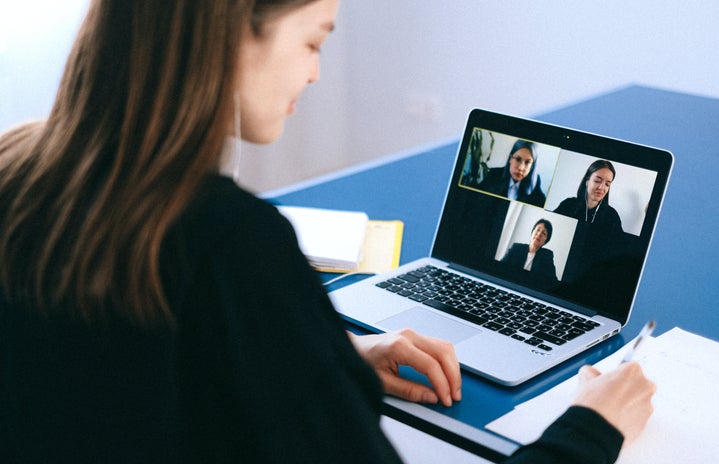My revelation began while sitting — more like lying — in bed with my boyfriend. He lay next to me, in his Modern China course speaking fluent Chinese, while I struggled to remain focused in Creative Writing. This was a usual occurrence. Immense boredom consumed my being as I stared motionless at my MacBook screen. Side conversation was necessary for survival.
“Do you ever notice how often everyone fixes their hair on Zoom?” my boyfriend said. “It’s like everyone uses Zoom as their own personal mirror.”
I slyly nodded my head, as I needed to maintain my professional classroom face. Ten minutes later, my boyfriend garnered my attention again. Yet this time, he brushed his hair with his fingertips, coiffing his stray hairs back into place. He did it once, twice, then three times.
Zoom has its advantages. Booty shorts to class. No shorts at all. Time for mindless shopping, in which I never purchase anything. However, any benefit of pantless class time is outweighed by the incessant scrutiny foisted upon my peers and myself by Zoom.
As part of Gen Z, unattainable beauty ideals are the norm. Snapchat filters slim faces and widen eyes. Facetune flattens bellies. Instagram posts eat at self-confidence. Upon analyzing selfie after selfie, I ignore the fact that these images are often unnatural and modeled. Individuals forge a perfected image of the self, where they construct exactly how they want to be perceived by the public. Controlling one’s image has transformed into a profession, as individuals control each aspect, or even each pixel, of their image. No one has the ability to see you how you see you; therefore, the selfie empowers its taker to have power — even if they are putting forth an inauthentic image. Most often, due to narcissistic tendencies and the competitiveness of social media, people lie, exaggerate and desire much beyond the truth.
Our exposure to these perfected images extends to Zoom. This desire for perfection is obsessive and serves as a distraction from daily activities. On Zoom especially, the rectangle which contains my image is all-consuming. I spend more time looking at myself than I do my professors and peers. This has less to do with self-obsession and more to do with personal insecurity. My rectangle lay in between the Victoria’s Secret-esque know-it-all and the girl who somehow still has the energy to wear a full face of makeup to online class (I applaud you).
Comparison is undeniable.
Related: How Quarantine Helped Me Get Comfortable In My Own Skin
We have grown up in a society which reinforces that our value is based on how we look. Oftentimes, our authentic bodies are compared to inauthentic, edited forms. I would be lying if I said I didn’t turn my camera off on the first day of my 100-person class to apply concealer after glancing at the beautiful faces on the screen. And I am not the only one guilty of such crimes.
From a piece of dental floss emerging into the corner of the screen followed by the removal of glasses (even by my closest friends who need them to see), from the back and forth of hair up to hair down, everyone battles with their own insecurities.
Yet, it is essential to focus attention not on self-image but the content of the class and the professors working tirelessly to teach during burdening times. Minimize negative thinking. Provide yourself with realistic patterns of thought. Next time you look on Instagram, take the possibility of photoshopped pictures into account. It is ever-present.
Focusing solely on appearance can distort self-confidence. Obsessing over flaws forces them to escalate. According to Vogue, “…it’s even more extreme for individuals who suffer with body dysmorphic disorder (BDD), an anxiety disorder that’s characterized by one’s obsessive idea that their appearance is severely flawed, and is said to affect as many as one in 50 people.”
Body dysmorphic disorder has been on the rise these last few months for individuals looking at themselves for 8+ hours on Zoom daily. Psychiatrist and author Dr. Katherine Phillips told NBC that “for those who don’t currently have BDD but are at risk of developing it, the stress of the current situation might trigger the onset of full-fledged BDD.”
Remember that behind each screen lies an individual with their own insecurity. COVID-19 has trapped us at home, looking into bathroom mirrors and utilizing social media as our only gateway into the outside world. Everyone is struggling more than usual, even if they are putting up a facade of ease.
Before the pandemic, people suffering from BDD and similar anxiety disorders could more easily cope with such conditions and attend therapy in person. It is more difficult to find resources in an online world, but remember to seek extra support if needed.
There is always someone to understand you and guide you. No issue or insecurity is too small to seek support and comfort.
For additional mental health resources, click here.



